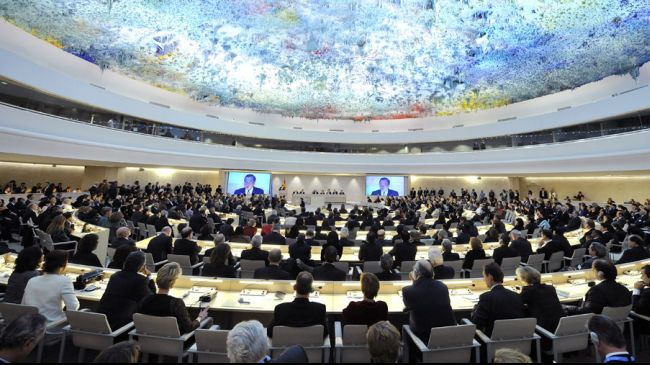
The UN Human Rights Council passed a resolution last week expressing concern over the human rights situation in Iran, and extended the mission of Asma Jahangir, the Special Rapporteur on human rights in Iran, and has asked the Iranian government to cooperate fully with her.
The UN Human Rights Council resolution on Iran was approved by 22 votes to 12, with 13 abstentions. The Council welcomed the report prepared and submitted by Asma Jahangir, stating that its contents are a source of “serious concern”.
In her report, Asma Jahangir referred to certain limited developments, including the signing of the Bill of Rights by President Hassan Rouhani, but at the same time pointed to the continuing problems concerning human rights in Iran. Iran has rejected Ms. Jahangir’s report and has alleged that it is born out of “political motives”.
Ms Jahangir expressed concern at the high number of executions, the use of punishments such as flogging and blinding, execution of under-age criminals, the use of torture and lack of due process in the judicial system of Iran.
She said that the Iranian regime uses the issue of national security to silence dissidents and democratic space is extremely limited. She particularly pointed to the violation of the rights of women, Kurds, journalists and political and civil activists, as well as religious minorities, mystical groups, Baha’is and Christian converts.
The UN Human Rights Council has approved Ms Jahangir’s report and has called on the Iranian authorities to cooperate with her by allowing her to visit Iran to collect the information necessary for her mission.
The full text of the resolution is published below:
Human Rights Council
Thirty-fourth session
27 February–24 March 2017
Agenda item 4
Human rights situations that require the Council’s attention
34/… Situation of human rights in the Islamic Republic of Iran
The Human Rights Council,
Guided by the Charter of the United Nations, the Universal Declaration of Human Rights, the International Covenants on Human Rights and other relevant international human rights instruments,
Recalling its resolutions 16/9 of 24 March 2011, 19/12 of 3 April 2012, 22/23 of 22 March 2013, 25/24 of 28 March 2014, 28/21 of 27 March 2015 and 31/19 of 23 March 2016, General Assembly resolution 71/204 of 19 December 2016 and all previous resolutions of the Assembly on the situation of human rights in the Islamic Republic of Iran, and regretting the lack of cooperation of the Islamic Republic of Iran with the requests of the Council and the Assembly made in those resolutions,
Welcoming the report and recommendations of the Special Rapporteur on the situation of human rights in the Islamic Republic of Iran submitted to the Human Rights Council,1 and expressing serious concern at the developments noted in that report and the lack of access permitted to the Special Rapporteur to travel to the Islamic Republic of Iran,
Recalling Human Rights Council resolutions 5/1, on the institution-building of the Council, and 5/2, on the Code of Conduct for Special Procedures Mandate Holders of the 2 Council, of 18 June 2007, and stressing that mandate holders are to discharge their duties in accordance with those resolutions and the annexes thereto,
- Decides to extend the mandate of the Special Rapporteur on the situation of human rights in the Islamic Republic of Iran for a further period of one year, and requests the Special Rapporteur to submit a report on the implementation of the mandate to the Human Rights Council at its thirty-seventh session and to the General Assembly at its seventy-second session;
- Calls upon the Government of the Islamic Republic of Iran to cooperate fully with the Special Rapporteur and to permit access to visit the country, and to provide all information necessary to allow the fulfilment of the mandate;
- Requests the Secretary-General to provide the Special Rapporteur with the resources necessary to fulfil the mandate.












 Posted in
Posted in 











